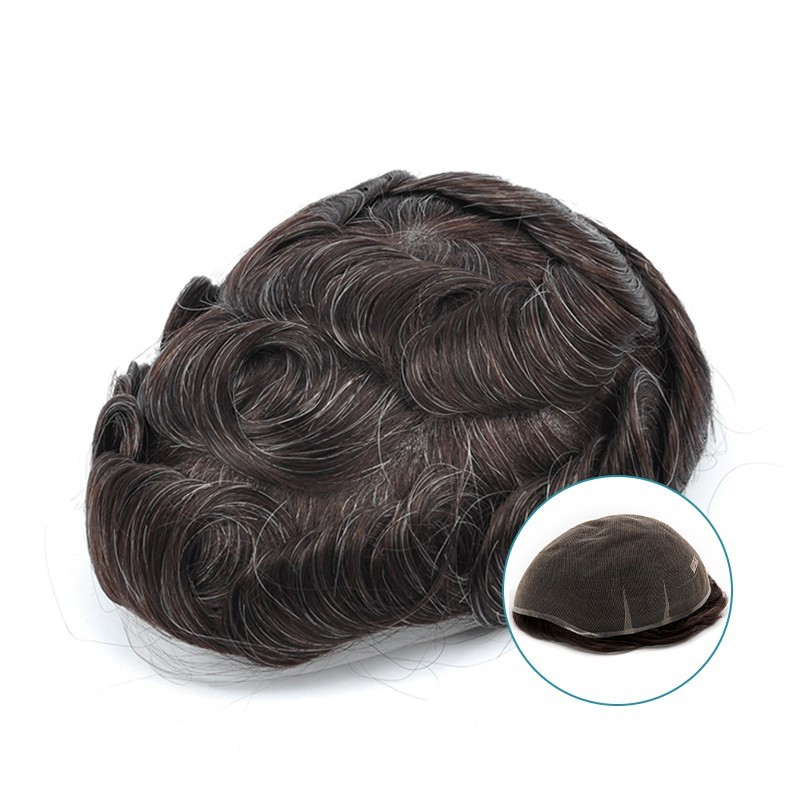For people experiencing hair loss, a hair system—also called a toupee, wig, or non-surgical hair replacement system—is a life-changing solution. It provides instant results, restores confidence, and avoids the risks of surgical procedures. But for those with sensitive skin or scalp conditions, a common concern arises: Are hair systems safe for sensitive skin?
The answer is generally yes, but it depends on the materials used, the method of attachment, and how well the system is maintained. Let’s explore how hair systems interact with sensitive skin, the potential risks, and how to make them as safe and comfortable as possible.

How Hair Systems Work
A hair system is made up of two main parts:
-
Base Material – usually lace, polyurethane (skin base), or a combination of both.
-
Hair – either human or synthetic, ventilated into the base.
The system is then attached to the scalp using medical-grade adhesives, tapes, or clips. When applied correctly, it blends seamlessly with natural hair and scalp, creating a natural look.
For people with sensitive skin, the adhesive or base material is usually the main source of irritation. That’s why it’s important to choose the right combination.
Are Hair Systems Safe for Sensitive Skin?
Yes, most hair systems are safe, even for sensitive skin. However, not all products and methods are equal. If you have sensitive skin, it’s important to consider:
-
The base material – Lace is breathable and lightweight, making it less irritating. Polyurethane bases may trap heat and moisture, which can sometimes cause discomfort.
-
The adhesive – Some glues or tapes may contain chemicals that cause allergic reactions or itching. Using hypoallergenic adhesives designed for sensitive skin reduces this risk.
-
Maintenance habits – Improper cleaning or infrequent removal can lead to bacteria buildup, causing irritation or rashes.
With the right choices, a hair system can be comfortable and irritation-free.
Common Issues for Sensitive Skin Wearers
While hair systems are safe, those with delicate skin may experience certain challenges:
1. Scalp Irritation
Adhesives and tapes can sometimes cause redness, itching, or dryness. This is more common with cheaper products that use harsh chemicals.
2. Allergic Reactions
Some individuals may develop allergic contact dermatitis from adhesives or base materials. Symptoms include burning, swelling, or a rash along the attachment area.
3. Sweat and Heat Build-Up
Sensitive skin can react negatively to trapped heat and moisture, especially under polyurethane bases. This can lead to discomfort or small breakouts.
4. Improper Cleaning
If the scalp or system isn’t cleaned regularly, oil, sweat, and adhesive residue can build up, increasing the chance of irritation.
How to Make Hair Systems Comfortable for Sensitive Skin
If you have sensitive skin, you can still safely enjoy the benefits of a hair system by following these tips:
Choose the Right Base Material
-
Lace bases are ideal because they’re breathable and lightweight, reducing heat and sweat build-up.
-
Hybrid bases (lace with polyurethane edges) can provide comfort along with strong adhesion.
Use Hypoallergenic Adhesives
Look for skin-safe, medical-grade glues or tapes labeled hypoallergenic. These are specifically formulated for sensitive skin and minimize allergic reactions.
Do a Patch Test
Before applying a new adhesive, perform a skin patch test. Apply a small amount to a discreet area and wait 24 hours to see if irritation occurs.
Maintain Good Hygiene
Clean your scalp thoroughly before reapplying the system. Removing old adhesive residue and using scalp-friendly cleansers prevents buildup that can cause irritation.
Give Your Skin a Break
If possible, take short breaks between applications to let your scalp breathe. Even a few hours can help reduce sensitivity.
Consult a Professional
A trained hair replacement specialist can recommend the best materials and products for your skin type. If irritation persists, a dermatologist can help identify specific allergies.
Are Hair Systems Safer Than Alternatives for Sensitive Skin?
Compared to surgical hair transplants, hair systems are far safer for people with sensitive skin. Surgery involves incisions, anesthesia, and recovery, which may worsen skin conditions.
Hair growth medications (like minoxidil or finasteride) can sometimes cause side effects such as redness, itching, or hormonal imbalances.
In contrast, a hair system is non-invasive. The only risks come from adhesives or materials, which can easily be adjusted by switching products.
Success Stories: Women and Men With Sensitive Skin
Many men and women with sensitive scalps successfully wear hair systems every day. For example:
-
Alopecia patients often have delicate skin yet rely on hair systems for natural coverage.
-
Chemotherapy patients use hair systems as a gentle alternative to wigs, finding them comfortable with hypoallergenic adhesives.
-
Men with oily or sweaty scalps choose lace bases that allow ventilation, preventing irritation.
These real-world experiences prove that with the right approach, hair systems are safe for sensitive skin.
Conclusion
So, are hair systems safe for sensitive skin? The answer is yes—when chosen and maintained carefully. By selecting breathable base materials, using hypoallergenic adhesives, and keeping a proper cleaning routine, most people with sensitive skin can wear a hair system comfortably and confidently.
If you have a history of allergies or skin conditions, consulting both a hair replacement specialist and a dermatologist is the best way to ensure your system works for you. With today’s advancements in non-surgical hair replacement, even those with delicate skin can enjoy the freedom and confidence of a full head of natural-looking hair.
